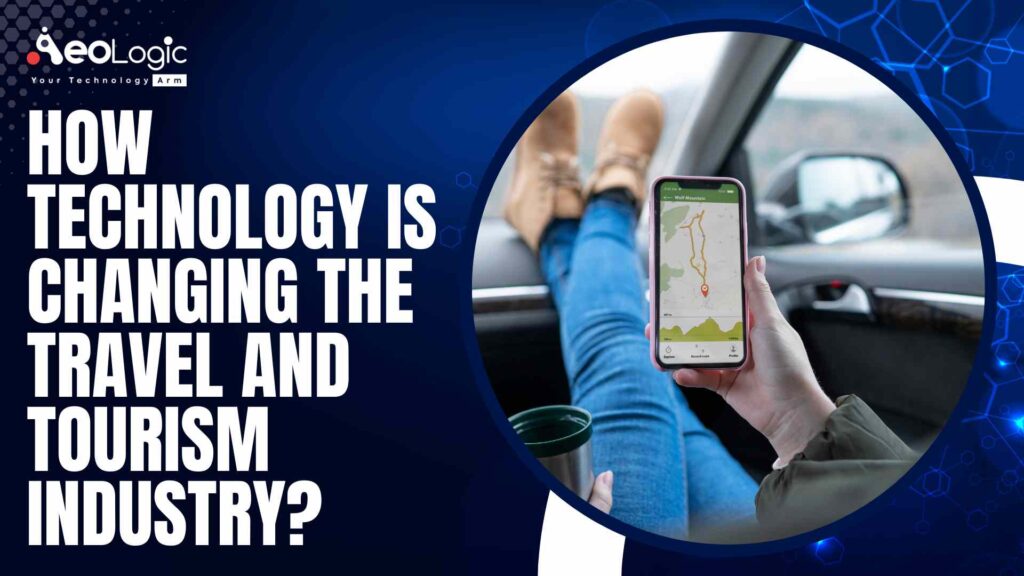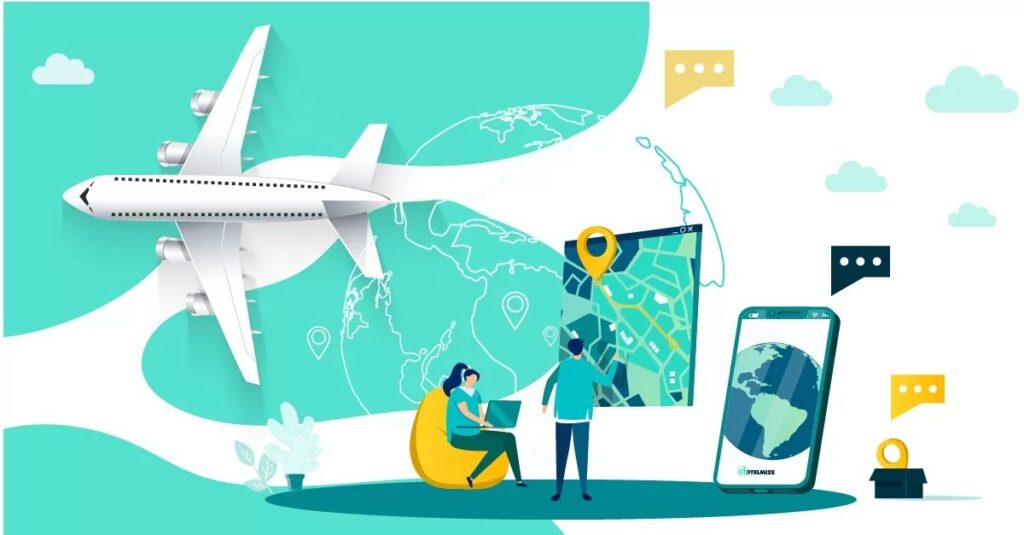Travel
How Technology is Changing the Way We Travel

Technology has revolutionized nearly every aspect of our lives, and travel is no exception. From the days of paper maps and bulky guidebooks to the era of real-time navigation and digital concierge services, the way we travel has undergone a dramatic transformation. In today’s tech-driven world, innovations in travel technology are reshaping the way we plan, book, and experience our journeys. This blog explores how technology is changing the way we travel and what these changes mean for the future of tourism.
How Technology is Changing the Way We Travel

1. Streamlined Booking Processes
Gone are the days of long queues at travel agencies and hours spent flipping through brochures. Technology has simplified the booking process, making it faster and more convenient. Online travel agencies (OTAs) like Expedia, Booking.com, and Airbnb allow travelers to compare prices, read reviews, and book flights, accommodations, and activities from the comfort of their homes.
Key Innovations:
- Artificial Intelligence (AI) and Machine Learning: These technologies analyze user preferences and browsing history to offer personalized recommendations and deals. AI chatbots provide instant customer support, answering queries and resolving issues in real-time.
- Dynamic Pricing: Platforms use algorithms to adjust prices based on demand, competition, and booking patterns, allowing travelers to find the best deals.
2. Enhanced Navigation and Mapping
Navigating new destinations can be challenging, but technology has made it easier than ever. Smartphones equipped with GPS, mapping apps, and real-time traffic updates have transformed the way we explore unfamiliar places.
Key Innovations:
- Google Maps and Navigation Apps: These apps offer turn-by-turn directions, real-time traffic updates, and public transportation information. They also feature offline maps, so travelers can navigate even without an internet connection.
- Augmented Reality (AR): AR apps overlay digital information onto the real world, helping travelers find points of interest, navigate streets, and even translate signs and menus instantly.
3. Personalization and Customization
Technology has made it possible to tailor travel experiences to individual preferences. From personalized travel itineraries to customized travel recommendations, technology enables a more personalized journey.
Key Innovations:
- Travel Apps and Platforms: Apps like TripIt and Google Trips consolidate all your travel information into one place, creating personalized itineraries and offering suggestions based on your interests.
- Wearable Technology: Devices like smartwatches and fitness trackers provide real-time updates on flight status, local weather, and your activity levels, enhancing the travel experience.
4. Smart Accommodations
The rise of smart technology has extended to accommodations, where tech-savvy hotels and vacation rentals offer advanced amenities and enhanced comfort.
Key Innovations:
- Smart Home Devices: Many hotels and vacation rentals now feature smart thermostats, voice-controlled assistants (like Amazon’s Alexa or Google Home), and keyless entry systems, providing a more convenient and personalized stay.
- Connected Hotel Rooms: Some hotels offer apps that allow guests to control room features such as lighting, temperature, and entertainment systems directly from their smartphones.
5. Digital and Contactless Payments
Handling money while traveling can be cumbersome, but technology has streamlined payment processes with digital and contactless options.
Key Innovations:
- Mobile Wallets: Services like Apple Pay, Google Wallet, and Samsung Pay allow travelers to make secure payments using their smartphones or smartwatches, reducing the need for physical cash or cards.
- Cryptocurrency: While still emerging, cryptocurrencies like Bitcoin and Ethereum are being accepted by more businesses, offering a digital alternative for international transactions.
6. Virtual and Augmented Reality Experiences
Virtual and augmented reality are transforming how we experience destinations before and during our travels. These technologies provide immersive previews and enhance our exploration of new places.
Key Innovations:
- Virtual Reality (VR) Tours: VR allows travelers to explore destinations and attractions virtually before booking, offering a preview of what to expect and helping them make informed decisions.
- Augmented Reality (AR) Guides: AR apps provide interactive tours and information about landmarks, museums, and other attractions, enriching the travel experience with contextual details and multimedia content.
7. Social Media and Influencer Impact
Social media has become a powerful tool for travel inspiration and planning. Platforms like Instagram, Facebook, and Pinterest are filled with travel photos, reviews, and recommendations that influence our travel choices.
Key Innovations:
- User-Generated Content: Travelers share their experiences, tips, and recommendations on social media, providing valuable insights and inspiration for others. This user-generated content can shape travel trends and influence destination popularity.
- Influencer Marketing: Travel influencers use their platforms to promote destinations, accommodations, and activities, often providing exclusive discounts or deals to their followers.
8. Sustainable Travel Technology
As environmental concerns grow, technology is also playing a role in promoting sustainable travel practices. Innovations aim to reduce the carbon footprint of travel and support eco-friendly initiatives.
Key Innovations:
- Eco-Friendly Transportation: Advances in electric and hybrid vehicles, as well as improved public transportation options, help reduce the environmental impact of travel.
- Carbon Offset Programs: Some travel platforms and airlines offer carbon offset options, allowing travelers to contribute to environmental projects that counterbalance their carbon emissions.
9. Health and Safety Innovations
In the wake of global health challenges, technology has enhanced health and safety measures for travelers, providing greater peace of mind.
Key Innovations:
- Health Apps and Alerts: Apps provide real-time updates on health and safety guidelines, travel restrictions, and vaccination requirements. They also offer information on local healthcare facilities and emergency services.
- Contactless Check-In: Many hotels and airlines have implemented contactless check-in and boarding processes to minimize physical contact and reduce the risk of spreading infections.
10. Language Translation Technology
Language barriers can be a significant obstacle when traveling, but technology has made communication easier with advanced translation tools.
How Technology is Changing the Way We Travel

Key Innovations:
- Real-Time Translation Apps: Apps like Google Translate offer instant translation of text, speech, and images, helping travelers communicate more effectively in foreign languages.
- Wearable Translators: Devices that translate spoken language in real-time provide a seamless communication experience, making interactions with locals more accessible and enjoyable.
Conclusion
Technology is profoundly changing the way we travel, making it more convenient, personalized, and efficient. From booking and navigation to accommodations and health safety, these innovations enhance every aspect of the travel experience. As technology continues to evolve, we can expect even more advancements that will further transform the way we explore the world. Embracing these changes not only makes travel easier but also opens up new possibilities for discovering and enjoying our global destinations. So, the next time you plan a trip, make sure to leverage the latest travel technologies to ensure a smooth and memorable journey.
Travel
Adventure Travel: The Best Destinations for Thrill-Seekers

Adventure travel is about pushing boundaries, embracing the unknown, and seeking exhilarating experiences that leave you breathless. For thrill-seekers, it’s more than just a vacation; it’s a journey that challenges the body and mind, offering memories that last a lifetime. Whether you’re scaling towering mountains, diving into the depths of the ocean, or navigating dense jungles, these destinations offer the ultimate rush for adrenaline junkies.
Adventure Travel: The Best Destinations for Thrill-Seekers

1. New Zealand: The Adventure Capital of the World
New Zealand is often dubbed the “Adventure Capital of the World,” and for good reason. With its diverse landscape of snow-capped mountains, lush rainforests, and vast lakes, this island nation offers an endless array of adrenaline-pumping activities.
Top Activities:
- Bungee Jumping: The world’s first commercial bungee jump was launched in Queenstown, New Zealand, and it remains a mecca for thrill-seekers. The Nevis Bungee Jump, one of the highest in the world at 134 meters, provides a free-fall experience like no other.
- Skydiving: For a breathtaking view of New Zealand’s dramatic landscapes, there’s no better way than jumping out of a plane. Skydiving spots like Lake Taupo and Franz Josef Glacier are among the most popular.
- Heli-skiing: For the ultimate skiing or snowboarding adventure, heli-skiing on untouched powder in the Southern Alps offers a truly once-in-a-lifetime experience.
2. Iceland: A Land of Fire and Ice
Iceland’s unique combination of volcanoes, glaciers, and rugged terrain makes it an ideal destination for thrill-seekers. This land of fire and ice offers extreme adventures in one of the most visually stunning environments on the planet.
Top Activities:
- Glacier Hiking and Ice Climbing: Iceland’s glaciers, such as Vatnajökull, are perfect for those looking to explore icy terrains. Experienced guides take adventurers through massive ice formations, caves, and crevasses, offering the chance to try your hand at ice climbing.
- Volcano Tours: With active volcanoes like Eyjafjallajökull, adventurers can take guided tours that explore volcanic craters, lava fields, and geothermal areas. For the truly daring, some tours even offer the opportunity to descend into the dormant Thrihnukagigur volcano.
- Snorkeling Between Continents: At Silfra, a fissure between the North American and Eurasian tectonic plates, you can snorkel in crystal-clear glacial water. The visibility is unmatched, making it an extraordinary underwater experience.
3. Costa Rica: A Jungle Playground
Costa Rica, with its biodiverse rainforests, pristine beaches, and volcanoes, is a natural playground for adventure lovers. Whether you’re deep in the jungle or on the Pacific coast, there’s no shortage of ways to get your heart racing. joyfulroamers.com
Top Activities:
- Zip-lining: Soar through the treetops of the lush Costa Rican rainforest in Monteverde or Arenal. Some zip-lining tours span over multiple kilometers, offering jaw-dropping views as you glide through the canopy.
- White-Water Rafting: Costa Rica’s rivers are perfect for white-water rafting, especially the Pacuare River, which offers challenging rapids amidst stunning jungle scenery. The combination of adrenaline and nature makes it a thrilling experience.
- Surfing: The Pacific coast of Costa Rica, particularly spots like Tamarindo and Nosara, is renowned for its world-class surfing. Whether you’re a seasoned surfer or a beginner, the waves here provide an adrenaline rush.
4. South Africa: Wildlife and Wilderness Adventures
South Africa is a haven for those who crave both the excitement of wildlife encounters and the rush of outdoor adventure. From shark-infested waters to expansive game reserves, it’s a destination that never disappoints the adventurous spirit.
Top Activities:
- Shark Cage Diving: Get up close and personal with one of nature’s most feared predators, the great white shark, off the coast of Gansbaai. Cage diving with these giants is an adrenaline-pumping experience that offers a once-in-a-lifetime thrill.
- Bungee Jumping from Bloukrans Bridge: At 216 meters, Bloukrans Bridge is the highest commercial bungee jump in the world. Jumping from this iconic bridge over the Bloukrans River gorge is not for the faint-hearted.
- Safari in Kruger National Park: While not traditionally associated with adrenaline, spotting lions, elephants, and rhinos on a safari can be a heart-pounding experience. Walking safaris, in particular, offer a closer and more immersive way to experience the wildlife of Africa.
5. Nepal: The Roof of the World
For those looking to push their physical and mental limits, Nepal is the ultimate destination. Known for being home to eight of the world’s tallest peaks, including Mount Everest, Nepal offers endless opportunities for adventure.
Top Activities:
- Trekking to Everest Base Camp: While summiting Everest is a monumental task, trekking to Everest Base Camp is an accessible yet challenging adventure. The 12-day trek takes you through the stunning landscapes of the Himalayas, offering breathtaking views and a true sense of achievement.
- White-Water Rafting on the Bhote Koshi River: Nepal’s rivers, fed by glacial meltwater, offer some of the best white-water rafting experiences in the world. The Bhote Koshi River, with its continuous rapids and steep drops, provides a thrilling ride.
- Paragliding in Pokhara: Soaring over the Annapurna range and Phewa Lake in Pokhara offers an adrenaline-filled yet serene experience. Paragliding in this mountainous region provides some of the best aerial views in the world.
6. Canada: Rugged Wilderness for the Brave
Canada’s vast wilderness, towering peaks, and immense lakes make it a paradise for outdoor enthusiasts. The country’s national parks and backcountry areas are ideal for those looking for rugged, off-the-beaten-path adventures.
Adventure Travel: The Best Destinations for Thrill-Seekers

Top Activities:
- Heli-hiking in British Columbia: For those who want to explore remote, pristine wilderness without the long trek, heli-hiking offers access to some of Canada’s most rugged and untouched terrain. Guided hikes lead you through alpine meadows, glaciers, and jagged peaks.
- Mountain Biking in Whistler: Whistler, famous for its ski slopes, transforms into a mountain biking haven in the summer. With over 80 kilometers of trails ranging from easy to extreme, it’s a mecca for biking enthusiasts.
- Canoeing in the Yukon: Paddle through the untouched wilderness of the Yukon River, surrounded by mountains, forests, and wildlife. This adventure offers a chance to connect with nature while experiencing the rush of navigating the wild waters.
Conclusion
Adventure travel is about more than just the thrill—it’s about pushing personal boundaries, embracing the unknown, and creating memories that last a lifetime. Whether it’s bungee jumping off a bridge in New Zealand, rafting through Costa Rica’s jungles, or trekking to Everest Base Camp, these destinations offer the perfect playground for thrill-seekers. So pack your bags, gather your courage, and set out on an adventure that will leave you forever changed.
Travel
Adventure Travel: The Best Destinations for Thrill-Seekers

For those with an unquenchable thirst for adventure, the world is a vast playground. From scaling the highest peaks to diving into the depths of the ocean, thrill-seekers are constantly looking for the next heart-pounding experience. If you’re someone who craves adrenaline and new challenges, here are some of the best destinations for adventure travel.
Adventure Travel: The Best Destinations for Thrill-Seekers

1. Queenstown, New Zealand
Dubbed the “Adventure Capital of the World,” Queenstown is the go-to destination for thrill-seekers. Nestled in New Zealand’s South Island, this town is surrounded by snow-capped mountains, crystal-clear lakes, and a myriad of opportunities for adventure.
Activities to Try:
- Bungee Jumping: Queenstown is the birthplace of commercial bungee jumping. The Kawarau Bridge offers a 43-meter leap into the abyss, while the Nevis Bungy, standing at 134 meters, is not for the faint-hearted.
- Skydiving: Imagine free-falling from 15,000 feet above New Zealand’s stunning landscape. Skydiving over Queenstown offers some of the most scenic views in the world.
- Jet Boating: Navigate the fast-flowing rivers of Queenstown on a high-speed jet boat, skimming past rocks and through narrow gorges at breakneck speeds.
2. Moab, Utah, USA
Moab is an adventurer’s paradise located in the heart of Utah. Famous for its striking red rock landscapes and proximity to both Arches and Canyonlands National Parks, Moab offers unique challenges and adventures that cater to adrenaline junkies.
Activities to Try:
- Rock Climbing: The sandstone cliffs around Moab are some of the most sought-after climbing destinations in the world. Whether you’re a beginner or an expert, Moab offers an incredible array of routes.
- Mountain Biking: Moab’s Slickrock Trail is one of the most famous mountain biking routes. Riders tackle challenging terrain while being surrounded by awe-inspiring landscapes.
- Canyoneering: Moab offers incredible opportunities for canyoneering. Rappelling down cliffs and navigating narrow canyons with ancient rock formations is a must for any adventurer.
3. Chamonix, France
Located in the French Alps, Chamonix is a haven for alpine enthusiasts. Adventure travelers flock here, especially in winter, to take advantage of the incredible snow sports and mountaineering opportunities.
Activities to Try:
- Skiing & Snowboarding: Chamonix boasts some of the most challenging off-piste skiing in the world. If you’re looking for extreme terrain and fresh powder, this is the place to be.
- Mountaineering: For those seeking the ultimate challenge, summiting Mont Blanc is a bucket-list adventure. At 4,810 meters, it’s the highest peak in Western Europe.
- Paragliding: If you’re looking for a less strenuous way to experience the stunning views of Chamonix, paragliding is a popular option. Soar over glaciers and mountain peaks with an unparalleled bird’s-eye view.
4. Costa Rica
Costa Rica is a Central American gem that attracts adventure travelers from around the world. The country’s rich biodiversity, tropical rainforests, and rugged coastlines make it perfect for those seeking an adrenaline rush.
Activities to Try:
- White-Water Rafting: The rivers in Costa Rica provide the perfect playground for white-water rafting. The Pacuare River, in particular, offers exhilarating Class III and IV rapids set against a backdrop of lush rainforests.
- Zip-Lining: Fly through the treetops of Costa Rica’s rainforests on some of the longest zip lines in the world. The feeling of soaring over canopies teeming with wildlife is unbeatable.
- Surfing: With both Pacific and Caribbean coastlines, Costa Rica is a world-class destination for surfing. Playa Hermosa and Nosara are two hotspots for catching waves.
5. Patagonia, Argentina and Chile
Patagonia is a vast, rugged region at the southern tip of South America, shared by Argentina and Chile. Its dramatic landscapes—massive glaciers, towering peaks, and expansive plains—make it a dream destination for adventure seekers.
Activities to Try:
- Trekking: The Torres del Paine National Park offers some of the most beautiful trekking routes in the world. The W Trek is particularly famous for its striking views of the iconic granite towers and glaciers.
- Ice Climbing: For those experienced in mountaineering, the opportunity to ice climb the region’s glaciers is a once-in-a-lifetime adventure. Glacier Grey and Perito Moreno Glacier are two popular spots.
- Kayaking: Explore the remote fjords and glacial lakes of Patagonia by kayak. The stillness of the water and the surrounding mountains create an awe-inspiring atmosphere for paddlers.
6. Iceland
Iceland’s otherworldly landscapes provide countless opportunities for adventure. From volcanic fields to ice caves, this island nation offers a truly unique experience for those seeking thrills.
Activities to Try:
- Glacier Hiking: Iceland is home to some of Europe’s largest glaciers. Guided tours take adventurers deep into the ice fields, providing the chance to explore blue ice caves and crevasses.
- Volcano Tours: Iceland is dotted with active and dormant volcanoes. You can even descend into the Thrihnukagigur Volcano, exploring its magma chamber—a unique experience for geology enthusiasts.
- Snorkeling and Diving: For something completely unexpected, try snorkeling or diving between two tectonic plates at Silfra, located in the Thingvellir National Park. The water is incredibly clear, offering visibility of up to 100 meters.
7. The Himalayas, Nepal
No list of adventure destinations would be complete without mentioning the Himalayas. For centuries, this region has been a pilgrimage site for mountaineers and trekkers alike.
Adventure Travel: The Best Destinations for Thrill-Seekers

Activities to Try:
- Trekking: The Everest Base Camp trek is one of the most iconic adventures in the world. It offers breathtaking views of the highest peaks on Earth, including Mount Everest.
- Mountain Climbing: For seasoned climbers, summiting the peaks of the Himalayas is the ultimate test of endurance and skill. While Mount Everest is the crown jewel, peaks like Ama Dablam and Lhotse also offer serious challenges.
- White-Water Rafting: Nepal’s rivers, fed by melting snow from the Himalayas, are perfect for white-water rafting. The Trishuli River offers Class III rapids, making it a thrilling but accessible adventure.
Conclusion
For those who thrive on adrenaline and seek to push their limits, these adventure travel destinations offer some of the most heart-pounding experiences in the world. Whether you’re scaling mountains, plunging into rivers, or flying through the air, the world is full of places where you can fuel your passion for adventure.
Travel
The Rise of Digital Nomads: How to Work and Travel the World

In recent years, the concept of working from an office has evolved dramatically. Gone are the days when professionals were tied to a cubicle from 9 to 5. The rise of technology, the internet, and a shift in workplace culture have given birth to a new breed of professionals—the digital nomads. These individuals are redefining the meaning of work by combining their careers with a love for travel, making the world their office. But what exactly is driving this trend, and how can you become a part of it?
The Rise of Digital Nomads: How to Work and Travel the World

What is a Digital Nomad?
A digital nomad is someone who leverages technology to work remotely, often from different locations around the world. Instead of staying rooted in one city or country, digital nomads travel frequently, exploring new cultures and environments while maintaining their professional commitments. Whether they’re working from a beachside café in Bali or a co-working space in Lisbon, digital nomads use the freedom of remote work to create a lifestyle that blends work and wanderlust.
The Growth of the Digital Nomad Movement
Several factors have contributed to the rapid growth of the digital nomad movement:
- Advances in Technology: The internet has made it easier than ever to stay connected and work from anywhere. Tools like Slack, Zoom, Google Workspace, and Asana enable seamless communication and project management. Fast Wi-Fi, cloud storage, and mobile devices allow professionals to handle complex tasks from remote locations.
- Remote Work Opportunities: With the rise of the gig economy, freelancing platforms like Upwork, Fiverr, and Freelancer have made it possible for individuals to find work opportunities in various fields, from writing and design to programming and consulting. Additionally, many companies have shifted to fully remote or hybrid work models, especially after the COVID-19 pandemic, which has further fueled the digital nomad lifestyle.
- Desire for Flexibility and Freedom: More people are realizing that life is too short to be confined to one place. The traditional work-life balance is being replaced by work-life integration, where professionals can pursue their passions, see the world, and still meet their career goals.
- Cost of Living and Quality of Life: For many digital nomads, traveling to countries with a lower cost of living allows them to save money while enjoying a higher quality of life. Cities like Chiang Mai in Thailand, Medellín in Colombia, and Budapest in Hungary offer affordable accommodations, vibrant communities, and a great quality of life, making them popular digital nomad hubs.
How to Become a Digital Nomad
Becoming a digital nomad may seem like a dream, but it’s achievable with careful planning and the right mindset. Here’s a step-by-step guide on how to make the transition:
1. Assess Your Job Situation
The first step to becoming a digital nomad is to determine whether your current job can be done remotely. Some industries are more suited to remote work than others. Professions like writing, graphic design, web development, marketing, and consulting are common among digital nomads because they rely primarily on laptops and internet connections.
If your current job doesn’t allow for remote work, consider negotiating with your employer for flexibility, or exploring freelance and contract opportunities in your field.
2. Build Marketable Skills
To thrive as a digital nomad, it’s important to have in-demand skills. Some popular skills among digital nomads include:
- Web Development & Design: Coding, website creation, and app development are highly sought-after services.
- Content Creation: Writing, photography, videography, and social media management are key for digital marketing.
- Marketing & SEO: Helping businesses grow their online presence through search engine optimization, email marketing, and PPC advertising is a lucrative option.
- Virtual Assistance: Managing schedules, emails, and tasks for businesses or entrepreneurs remotely.
Invest in online courses, certifications, and self-study to strengthen your expertise in these areas.
3. Create a Sustainable Income Stream
Before embarking on your nomadic journey, ensure that you have a steady income. This could be through freelancing, running a small online business, or working remotely for a company. Building multiple income streams, such as passive income from investments, a blog, or an e-commerce store, can provide added security. joyfulroamers.com
Saving an emergency fund equivalent to at least six months’ living expenses is advisable, as the cost of living and unexpected travel expenses can fluctuate.
4. Plan Your Destinations Wisely
One of the best parts of being a digital nomad is the ability to choose where you work. When deciding on destinations, consider the following factors:
- Cost of Living: Research cities that fit your budget, where you can live comfortably while saving.
- Internet Connectivity: Ensure that your chosen destination has reliable and fast Wi-Fi, which is essential for remote work.
- Community: Many cities have vibrant digital nomad communities, making it easy to network and form friendships. Popular digital nomad hubs include Bali, Thailand, Mexico City, and Portugal.
5. Find the Right Accommodation
Your living situation can make or break your experience as a digital nomad. There are a few options for accommodation, including:
- Airbnb or Vacation Rentals: Perfect for short-term stays, with options to extend as needed.
- Co-living Spaces: These are designed for digital nomads, offering shared workspaces and opportunities to meet other like-minded individuals.
- Hostels and Hotels: These can be affordable options for short-term stays, but may lack the quiet needed for work.
6. Stay Organized and Productive
Maintaining productivity while traveling can be challenging. Set a routine that balances work and exploration. Some tips for staying on track include:
- Time Management: Use tools like Google Calendar or Todoist to organize your work tasks.
- Work-Life Balance: Schedule time for work but also set aside time to explore your surroundings and relax.
- Stay Healthy: Travel can be exhausting, so prioritize exercise, sleep, and a healthy diet to keep your energy up.
7. Stay Connected and Safe
Always have a backup plan in case of unreliable internet, power outages, or other challenges. Carry a mobile hotspot or SIM card with data to ensure constant connectivity. Make sure to research visa requirements and stay up-to-date on health and safety measures in the countries you’re visiting.
The Rise of Digital Nomads: How to Work and Travel the World
The Future of Digital Nomadism
As remote work continues to gain popularity, the digital nomad lifestyle is likely to grow. More countries are recognizing the economic potential of attracting digital nomads and have begun offering specialized visas, such as Estonia’s Digital Nomad Visa or Barbados’s Welcome Stamp. This makes it easier for nomads to live and work legally in various countries for extended periods.
Final Thoughts
The rise of digital nomadism marks a significant shift in how people approach work and life. For those seeking adventure, flexibility, and the chance to explore the world while maintaining a career, becoming a digital nomad offers an exciting and rewarding lifestyle. With the right skills, mindset, and preparation, the dream of working from anywhere can become a reality, allowing you to combine your passions with your profession.
The Rise of Digital Nomads: How to Work and Travel the World
-

 Politics6 months ago
Politics6 months agoNarendra Modi’s Heartfelt Connection with Kashi and Maa Ganga
-

 Travel6 months ago
Travel6 months ago6 Essential Travel Tips and Hacks for the Savvy Traveler
-

 Web Stories6 months ago
Web Stories6 months agoTips to Protect Your Smartphone from Getting Hacked
-

 Technology6 months ago
Technology6 months ago6 Essential Tips to Protect Your Smartphone from Getting Hacked
-

 Trending5 months ago
Trending5 months agoGoogle Gemini AI App Debuts in India: How It Operates on Android Devices – Comprehensive Guide
-

 Travel5 months ago
Travel5 months ago6 Budget Travel Without Visa from India: Top Destinations
-

 Travel5 months ago
Travel5 months ago6 Hill Stations in West Bengal That Are Perfect in July
-

 Fitness5 months ago
Fitness5 months ago5-Minute Workouts: Effective Home Exercises



